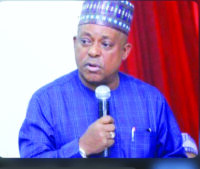Ola Belgore
A few days ago, at one of Nigeria’s busiest airports, a controversial incident reportedly occurred: a well-known public figure is said to have delayed the departure of a commercial flight following a disagreement with airport officials. According to multiple reports, what began as a dispute over a personal item allegedly escalated to the point where the individual walked onto the tarmac to prevent the aircraft from taking off.
While some details remain unclear, and the facts continue to emerge, the broader conversation should go beyond this specific event. It invites us to reflect on deeper questions about power, privilege, and public accountability in Nigeria.
Understanding ‘Bigmannism’
What some refer to as “Bigmannism” is a cultural dynamic seen across many societies — especially in Nigeria — where influence, wealth, or status can appear to override laws and procedures. It manifests in various ways:
• Siren-blaring convoys ignoring traffic laws
• VIPs skipping airport security checks
• Celebrities bypassing queues or standard protocols
•Public figures disregarding invitations to legal or administrative panels
This airport incident, whether isolated or symptomatic, provides a lens through which we can examine how entrenched this dynamic has become.
Status at 30,000 Feet
The individual involved in this situation is a respected professional with longstanding ties to political and cultural institutions. That status may have influenced how events unfolded — not necessarily through intent, but through the assumptions and expectations often placed on, or by, people in positions of influence.
Reports suggest that protocol was not followed, and that the situation escalated in ways that raised safety and procedural concerns. In many jurisdictions, interfering with airport operations is treated as a serious matter — not necessarily because of who is involved, but because of the implications for public safety.
“Do You Know Who I Am?”: A Broader Reflection
This now-familiar phrase has become emblematic of the perceived divide between the influential and the ordinary in Nigeria. But perhaps it is less about arrogance and more about the social structures that make such expressions feel effective — and, at times, necessary to assert one’s place in the hierarchy.
When institutions appear flexible for some and rigid for others, people begin to equate authority with exemption. This is less a personal failing and more a systemic issue — one that rewards status over process, and access over equity.
State Power and Personal Privilege
We increasingly see public resources, such as law enforcement personnel, used in ways that blur the lines between official duty and personal service — from escorts for non-governmental errands to ceremonial displays of status. While these acts may seem minor, they gradually erode the credibility of public institutions.
The question isn’t whether individuals should be respected — they should. But when that respect turns into preferential treatment that others cannot access, it chips away at the rule of law and public trust.
What Might Happen Elsewhere?
In other contexts — particularly in Europe or North America — obstructing the operations of a commercial aircraft could trigger swift and serious legal responses. These responses are typically institutional, not personal, and serve as signals of systemic resilience. They communicate that no one is above the law — not out of hostility, but out of commitment to safety and fairness.
In Nigeria, responses to similar situations are often inconsistent — not necessarily out of negligence, but perhaps due to cultural, institutional, or political complexity. This inconsistency, however, leads to a deeper issue: the perception that accountability is negotiable.
Two Standards, One Society
At the heart of this issue is a perceived duality in governance:
• One set of rules for the everyday citizen
• Another for those with status or connections
While many Nigerians are held strictly to account for minor infractions, others seem to navigate the system with greater flexibility. This isn’t always the result of malice — sometimes it’s inertia, sometimes it’s fear, and sometimes it’s simply how things have always worked.
But the consequences are real. It sends the message that compliance is optional for some — and mandatory for others.
The Impact on Young Nigerians
In environments where social capital appears more powerful than moral capital, young people receive clear — and concerning — signals:
• That success is about who you know, not how you behave
• That status brings freedom, and humility invites hardship
• That following the rules might make you invisible, while breaking them could make you celebrated
These messages shape ambition in ways that may not serve the long-term health of the society.
Looking Beyond the Incident
The incident on the tarmac is not just about one person or one moment — it points to a broader national challenge. When the mechanisms of accountability are inconsistent, it affects not just airports, but hospitals, schools, courtrooms, and even the ballot box.
Where Do We Go from Here?
The goal is not to shame or single out individuals, but to ask: How can we collectively strengthen our institutions so that respect for rules becomes the norm, regardless of status?
Solutions could include:
• Strengthening the independence of public agencies
• Creating clearer boundaries between personal privilege and public responsibility
• Fostering a civic culture where influence comes with higher — not lower — expectations
Perhaps it’s time we shift the narrative from “Do you know who I am?” to “What kind of country do we want to build?”
A Final Word
If we want a Nigeria where justice is not a function of identity — but of principle — we must start holding ourselves and our systems to higher standards. Bigmannism, whether at the airport or in politics, is not a fixed trait. It’s a learned behavior — and, with collective will, it can be unlearned.
Let’s begin not with outrage, but with introspection.
Belgore is the CEO of Utica Capital.















Leave a comment